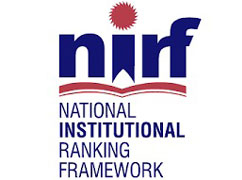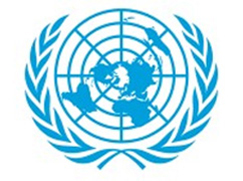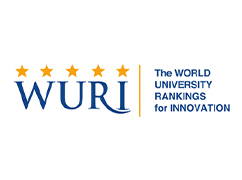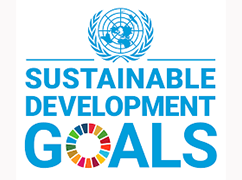Certificate from Mahatma Gandhi National Council for Rural Education (MGNCRE), Ministry of Education, Govt of India, recognising CHRIST(Deemed to be University) as a Social Entrepreneurship Swachhta & Rural Engagement cell (SES & REC) institution.
CHRIST University is now recognized as a part of the Social Entrepreneurship, Swachta, Rural Engagement Cell. SES REC was launched by the Ministry of Education, GOI under the Mahatma Gandhi Council for Rural Education (MGNCRE). As part of this initiative; CHRIST has created 10 groups that work in-campus and in the project areas of CSA. These teams are led by faculties from different departments and CSA staff in charge.
There are five areas of focus that come under the SES REC Action Plan:
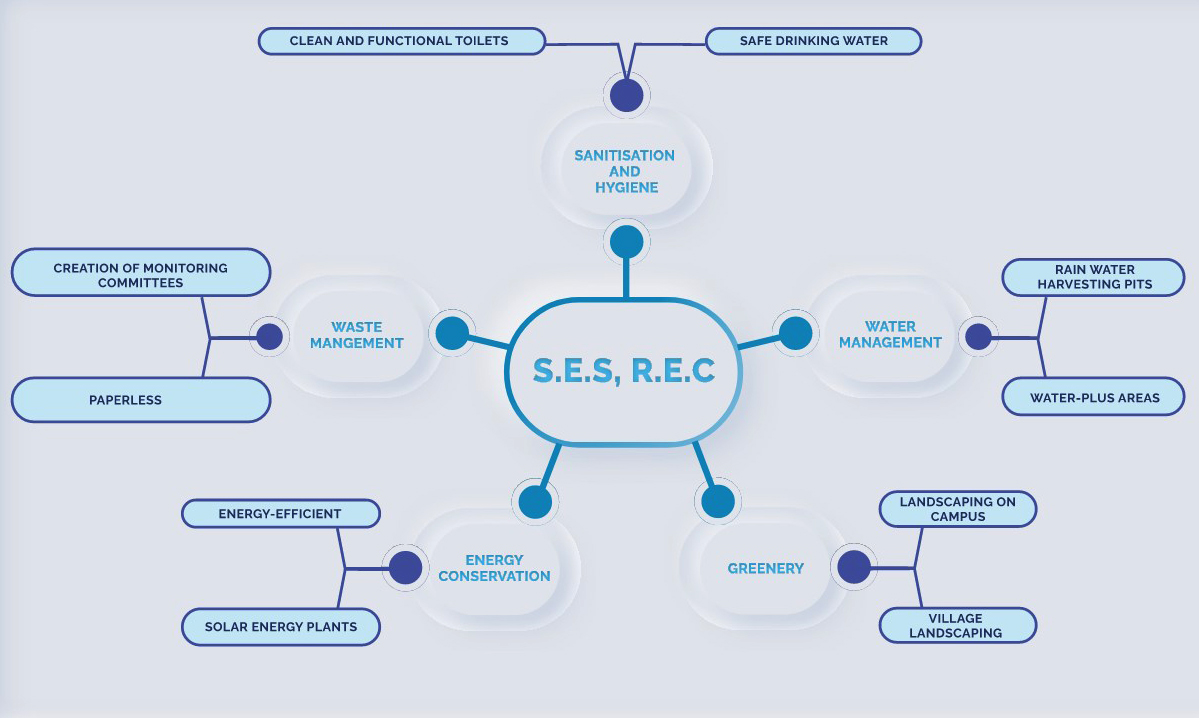
Post COVID-19 Sanitation Measures and Drills that come as suggestions and future points of implementation include clean and functional toilets, safe drinking water, and clean surroundings with zero littering policy in the campus in a broader sense.
The institution also plans to organise awareness programs for better sanitisation practices; involvement of SHGs in mask-making; performance of Nukkad nataks or street plays around the concept of Swachhta and Covid 19; as well as conducting door-to-door surveys and meetings to drive behavioral change with respect to sanitation behavior.
Post COVID-19 Sanitation Measures and Drills that come as suggestions and future points of implementation include clean and functional toilets, safe drinking water, and clean surroundings with zero littering policy in the campus in a broader sense.
The institution also plans to organise awareness programs for better sanitisation practices; involvement of SHGs in mask-making; performance of Nukkad nataks or street plays around the concept of Swachhta and Covid 19; as well as conducting door-to-door surveys and meetings to drive behavioral change with respect to sanitation behavior.
In the border sense, the activities included under waste management are the creation of monitoring committees in order to stop open defecation in villages; prepare Information Education Communication Material (IEC); set up RO plants for safe and clean drinking water. Along with these major initiatives, we also aim to set up telemedicine and mobile health care centers, support Asha workers with innovative tools to ease their work, installing biogas plants, and innovative technology-based solutions for rural waste recycling (eg cow dung cake making machine, converting solid waste into bricks, etc). All of these will be carried out by partnering with local NGOs and CSR organizations in this field.
We envision going paperless in order to reduce waste by using WhatsApp and emails for communication. Waste recycling through community composting, recycling of farm and paper waste would be conducted along with setting up mechanisms for recycling. The waste reduction would be carried out through banning plastic and flex banners, awareness camps about Clean and Green Village (Zero Littering — IEC Material).
In the border sense, the activities included under waste management are the creation of monitoring committees in order to stop open defecation in villages; prepare Information Education Communication Material (IEC); set up RO plants for safe and clean drinking water. Along with these major initiatives, we also aim to set up telemedicine and mobile health care centers, support Asha workers with innovative tools to ease their work, installing biogas plants, and innovative technology-based solutions for rural waste recycling (eg cow dung cake making machine, converting solid waste into bricks, etc). All of these will be carried out by partnering with local NGOs and CSR organizations in this field.
We envision going paperless in order to reduce waste by using WhatsApp and emails for communication. Waste recycling through community composting, recycling of farm and paper waste would be conducted along with setting up mechanisms for recycling. The waste reduction would be carried out through banning plastic and flex banners, awareness camps about Clean and Green Village (Zero Littering — IEC Material).
Acute water shortages in many parts of India and Bangalore specifically have made this initiative more important than ever before. Under this, audits of water sources in the campus; audits of monthly water use in the campus; audits of drinking water on campus would be carried out frequently.
To save water, the institution will also engage in constructing and increasing the number of Rain Water Harvesting pits on the campus, activities for recharging dry borewells, fixing leaky taps, and recycling water (grey, brown and black). Along with conducting all of these in our project areas as well, the institution aims to set up soak pits, construct harvesting pits and check dams to ultimately convert villages into water-plus areas. All the activities will be carried out in partnership with Coca! NGOs and CSR organizations in this field.
Acute water shortages in many parts of India and Bangalore specifically have made this initiative more important than ever before. Under this, audits of water sources in the campus; audits of monthly water use in the campus; audits of drinking water on campus would be carried out frequently.
To save water, the institution will also engage in constructing and increasing the number of Rain Water Harvesting pits on the campus, activities for recharging dry borewells, fixing leaky taps, and recycling water (grey, brown and black). Along with conducting all of these in our project areas as well, the institution aims to set up soak pits, construct harvesting pits and check dams to ultimately convert villages into water-plus areas. All the activities will be carried out in partnership with Coca! NGOs and CSR organizations in this field.
Under Energy conservation initiatives, conducting audits of energy-efficient heating, cooling, lighting, and water systems on the campus as well as building-wise audits of monthly use of electricity would be carried out. To reduce electricity consumption in buildings, departments would be provided incentives. Along with short and long-term plans for solar energy on campus. To reduce carbon footprints on campus; intelligent Purchase Standard Operating Procedures(SOPs) would be used and usage of cycles would be promoted.
In project areas, this initiative envisages the creation of Wind and Solar Energy Plants along with the creation and implementation of Sustainable Rural Energy Plans. The use of frictionless foot valves will help in considerably reducing the consumption of diesel. The feasibility of using rechargeable battery-operated systems would be tested across various occupations and institutions. The use of mechanical washing machines would be promoted to empower women. Awareness camps on energy-efficient electrical appliances and IEC about the benefits of related government programs would also be carried out.
Under Energy conservation initiatives, conducting audits of energy-efficient heating, cooling, lighting, and water systems on the campus as well as building-wise audits of monthly use of electricity would be carried out. To reduce electricity consumption in buildings, departments would be provided incentives. Along with short and long-term plans for solar energy on campus. To reduce carbon footprints on campus; intelligent Purchase Standard Operating Procedures(SOPs) would be used and usage of cycles would be promoted.
In project areas, this initiative envisages the creation of Wind and Solar Energy Plants along with the creation and implementation of Sustainable Rural Energy Plans. The use of frictionless foot valves will help in considerably reducing the consumption of diesel. The feasibility of using rechargeable battery-operated systems would be tested across various occupations and institutions. The use of mechanical washing machines would be promoted to empower women. Awareness camps on energy-efficient electrical appliances and IEC about the benefits of related government programs would also be carried out.
To promote a greener environment, under this initiative, the institution aims to set up a nursery/kitchen garden, a seed bank, and a compost pit. Along with that, to properly care for the nursery, research about trees that take up minimal water and are good for the ecosystem (local, resilient species) would be taken up. These will then be planted during the monsoon.
Conducting landscaping on the campus and use of organic manure for the plants will be other areas of focus. Along with that, the new buildings on the campus will follow green building norms. For project areas, village landscaping, smokeless stoves, eco-friendly agricultural practices will be promoted. Growing Miyawaki forests and Nakshatravanam on barren land would be carried out under the Village Greenery Programme. These will be conducted in partnership with local NGOs and CSR organizations in this field.
To promote a greener environment, under this initiative, the institution aims to set up a nursery/kitchen garden, a seed bank, and a compost pit. Along with that, to properly care for the nursery, research about trees that take up minimal water and are good for the ecosystem (local, resilient species) would be taken up. These will then be planted during the monsoon.
Conducting landscaping on the campus and use of organic manure for the plants will be other areas of focus. Along with that, the new buildings on the campus will follow green building norms. For project areas, village landscaping, smokeless stoves, eco-friendly agricultural practices will be promoted. Growing Miyawaki forests and Nakshatravanam on barren land would be carried out under the Village Greenery Programme. These will be conducted in partnership with local NGOs and CSR organizations in this field.
Address
Dharmaram College Post, Hosur Road, Bengaluru – 560029, Karnataka, India
Telephone
+91 804012 9100 / 9600
Send us a Fax
40129000
Mail Us At
mail@christuniversity.in


